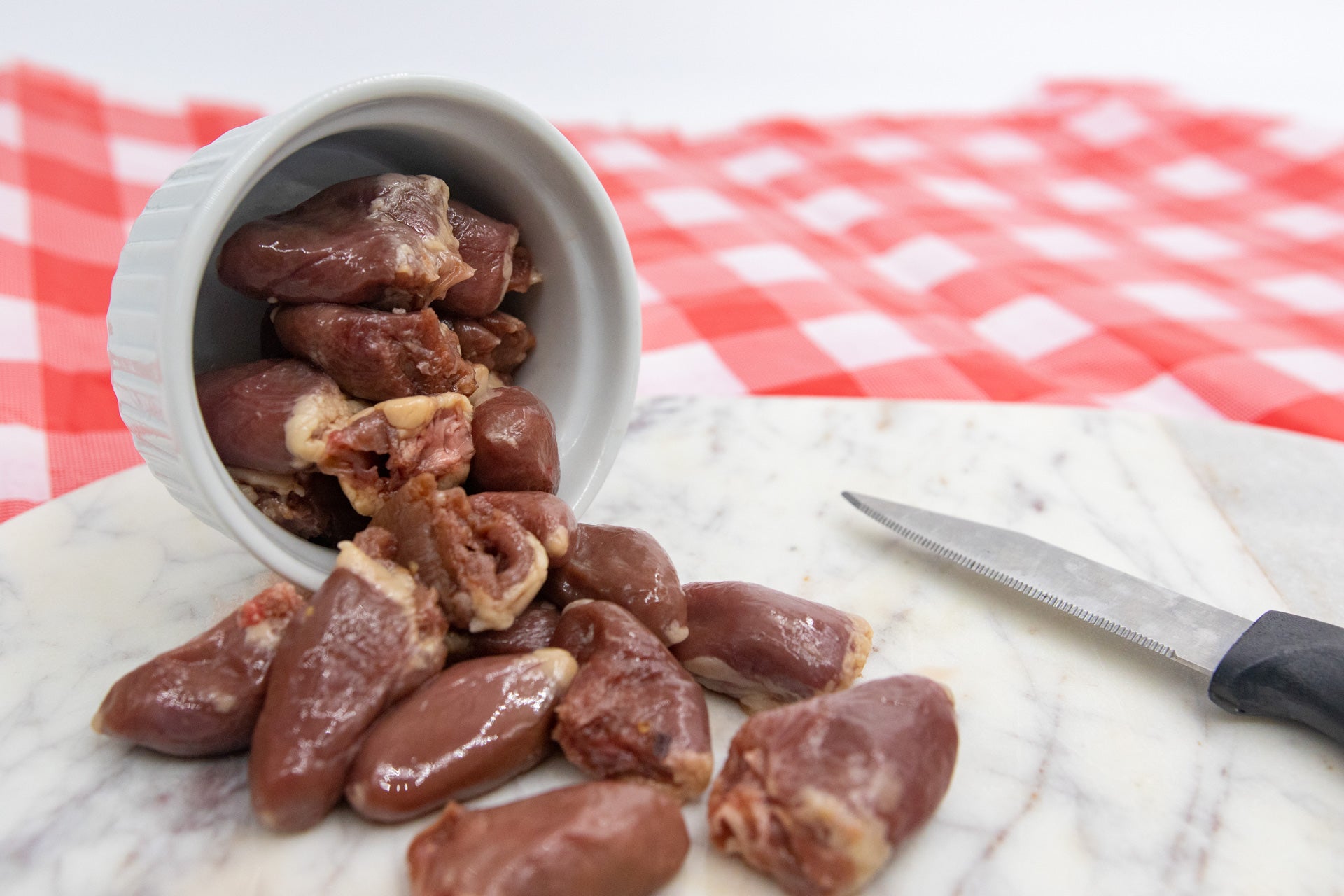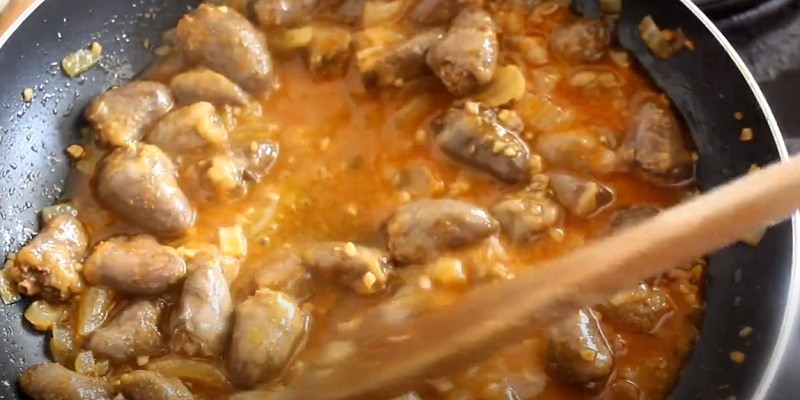Yes, dogs can eat chicken hearts, as they are a good source of protein and nutrients. Chicken hearts are safe and healthy for dogs to consume as part of a balanced diet.
They are packed with essential vitamins and minerals like iron, zinc, and B vitamins, which support overall canine health. Additionally, chicken hearts are low in fat and have a lower cholesterol content compared to other organ meats, making them a nutritious choice for dogs.
However, it is important to feed chicken hearts in moderation and ensure they are thoroughly cooked to avoid any bacterial contamination. As always, it is best to consult with your veterinarian before introducing any new foods into your dog’s diet.
Benefits Of Chicken Hearts For Dogs
Chicken hearts can be a beneficial addition to a dog’s diet, providing a good source of protein, vitamins, and minerals. They are safe for dogs to eat and can contribute to their overall health and well-being.
Nutritional Value Of Chicken Hearts
Chicken hearts are packed with essential nutrients that can benefit your furry friend’s overall health. These tiny yet mighty organs are an excellent source of vital vitamins and minerals. They are a rich source of iron, vitamin B12, zinc, and selenium.
Iron plays a crucial role in oxygen transportation, promoting healthy blood circulation, and preventing anemia. Vitamin B12 is essential for proper brain function and maintaining a healthy nervous system. Zinc and selenium are important for supporting immune function and preventing cell damage.
Rich Source Of Protein For Dogs
Protein is a fundamental nutrient for dogs, as it provides the building blocks for their muscles, tissues, and organs. Chicken hearts are an excellent source of high-quality protein. They contain all the essential amino acids that dogs need to thrive. Amino acids are crucial for muscle development, tissue repair, and overall growth.
High In Essential Amino Acids
The amino acids found in chicken hearts have a multitude of benefits for your canine companion. Methionine and lysine, two essential amino acids abundant in chicken hearts, are involved in the production of collagen, which supports skin and coat health. They also aid in the absorption of calcium, promoting strong bones and teeth.
Benefits For Muscle Development And Repair
Feeding your dog chicken hearts can have significant benefits for muscle development and repair. The high protein content in chicken hearts supports muscle growth, making them an ideal choice for active or athletic dogs. Additionally, the amino acids in chicken hearts aid in the repair of muscle tissue, ensuring quick recovery after physical activity or injury.
Risks And Considerations Of Feeding Chicken Hearts To Dogs
Potential Choking Hazard
One of the potential risks of feeding chicken hearts to dogs is the possibility of choking. Chicken hearts are small and can be swallowed whole by dogs, especially smaller breeds. This can lead to respiratory distress or blockage of the airway, posing a serious health risk. It is important to consider the size of the dog and the texture of the chicken hearts before offering them as a treat or part of their diet.
High Cholesterol Content
Chicken hearts are very high in cholesterol, which can be a concern, especially for dogs with existing heart conditions or those prone to developing such conditions. While the occasional inclusion of chicken hearts in a dog’s diet may not pose a significant problem, a high cholesterol intake could potentially contribute to cardiovascular issues over time. It is advisable to consult with a veterinarian before incorporating chicken hearts into your dog’s regular meals.
Sodium Concerns
Chicken hearts naturally contain a moderate amount of sodium, which can be concerning for dogs on low-sodium diets or those with kidney problems. Excessive sodium intake can increase blood pressure and strain the kidneys. Therefore, it is crucial to consider your dog’s specific dietary needs and health conditions before introducing chicken hearts into their diet. It is always best to consult with a veterinarian for personalized advice.
Portion Control And Moderation
As with any treat or addition to a dog’s diet, portion control and moderation are vital. While chicken hearts can provide nutritional benefits like protein and essential vitamins, it is important not to overfeed them. Too much of a good thing can lead to digestive issues or weight gain. To ensure your dog’s overall well-being, it is recommended to offer chicken hearts in moderation and as part of a balanced diet.
How To Safely Feed Chicken Hearts To Dogs
Chicken hearts are a nutritious and delicious treat that you can incorporate into your furry friend’s diet. Rich in protein, iron, and essential vitamins, these small organ meats can provide numerous health benefits for your dog. However, it’s important to follow proper precautions and guidelines to ensure your dog’s safety and well-being. In this article, we will discuss various methods to safely feed chicken hearts to dogs, including preparation and cooking techniques, incorporating them into a balanced diet, consulting with a veterinarian, and monitoring for any adverse reactions or allergies.
Preparation And Cooking Methods
Before feeding chicken hearts to your dog, it’s crucial to prepare and cook them properly. Here are some steps you should follow:
- Start by purchasing fresh and high-quality chicken hearts from a reputable source. Look for organic options if possible.
- Thoroughly wash the chicken hearts under running water to remove any dirt or debris.
- Remove any excess fat or connective tissue from the hearts.
- Cut the hearts into small, bite-sized pieces to make them easier for your dog to chew and digest.
- Choose a suitable cooking method. Boiling or steaming the chicken hearts is a popular option, as it helps retain their nutritional content. Avoid adding any additional seasonings or additives.
- Cook the hearts until they are fully cooked but still tender. Overcooking may make them hard and less palatable for your dog.
- Allow the cooked chicken hearts to cool before serving them to your dog.
Incorporating Chicken Hearts Into A Balanced Diet
While chicken hearts can be a healthy addition to your dog’s diet, it’s important to ensure they are part of a balanced meal plan. Here’s how you can incorporate them:
- Use chicken hearts as a treat or topper: Add a few cooked chicken hearts as a special treat or as a flavorful topper on your dog’s regular food.
- Add them to homemade meals: If you prepare homemade meals for your dog, you can include chicken hearts as one of the protein sources in their balanced recipe.
- Consider portion sizes: Chicken hearts should only make up a small portion of your dog’s overall diet. Consult with your veterinarian to determine the appropriate amount based on your dog’s size, age, and specific dietary needs.
Consulting With A Veterinarian
Prior to introducing any new food into your dog’s diet, it’s always wise to consult with your veterinarian. While chicken hearts are generally safe for dogs to consume, individual dogs may have specific health conditions or dietary restrictions that need to be taken into consideration. Your vet can provide personalized guidance and ensure that chicken hearts are suitable for your dog.
Monitoring For Any Adverse Reactions Or Allergies
After feeding chicken hearts to your dog for the first time, it’s essential to monitor them for any adverse reactions or signs of allergies. Keep an eye out for symptoms such as vomiting, diarrhea, itching, or swollen paws. If you notice any unusual reactions, discontinue feeding chicken hearts and consult your veterinarian for further guidance.
By following these guidelines, you can safely incorporate chicken hearts into your dog’s diet as a nutritious and tasty addition. Remember to always prioritize your dog’s health and consult with a professional if you have any concerns or questions.

Credit: www.bjsrawpetfood.com
Frequently Asked Questions For Can Dogs Eat Chicken Hearts?
Can Dogs Safely Eat Chicken Hearts?
Yes, dogs can safely eat chicken hearts as they are a great source of protein, vitamins, and minerals.
Are Chicken Hearts A Healthy Treat For Dogs?
Yes, chicken hearts are a healthy treat for dogs as they provide essential nutrients like iron, zinc, and vitamin B12.
How Should Chicken Hearts Be Prepared For Dogs?
Chicken hearts should be fully cooked and served plain without any seasoning or additives for optimal safety and nutrition.
How Many Chicken Hearts Can Dogs Eat In A Day?
The number of chicken hearts dogs can eat in a day depends on their size and dietary needs. It is best to consult with a veterinarian.
Can Chicken Hearts Cause Any Health Issues In Dogs?
If given in moderation, chicken hearts are generally safe for dogs. However, excessive consumption can lead to upset stomach or pancreatitis.
Are There Any Alternatives To Chicken Hearts For Dogs?
Yes, if your dog cannot or should not eat chicken hearts, other organ meats like liver or gizzards can be offered as alternatives.
Conclusion
Chicken hearts can be a healthy and nutritious addition to a dog’s diet, as they are packed with essential nutrients like iron and proteins. However, it is important to feed them in moderation and always consult with your veterinarian before making any dietary changes.
Remember, every dog is unique, and what works for one may not work for another. As with any new food, introduce chicken hearts gradually and watch for any adverse reactions. Your furry friend’s well-being is always the top priority!
Last Updated on April 23, 2025 by Pauline G. Carter

